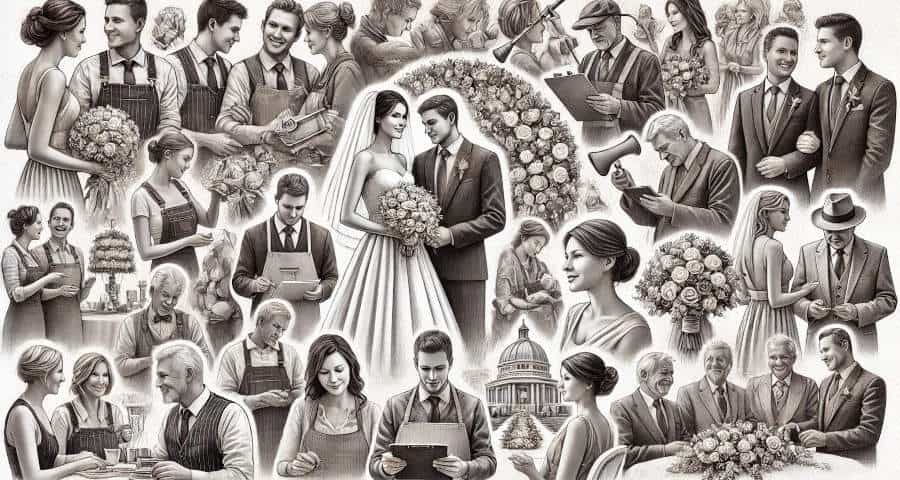Planning a wedding means coordinating many different roles and responsibilities, each crucial to the success of your big day.
From the Maid of Honor to the Ring Bearer, every person involved has a special part to play in making your wedding dreams come true.
Knowing who does what helps manage expectations and ensures that everyone you choose to fill these roles understands their responsibilities.
Important Roles in a Wedding
Here’s the various roles you might consider when planning your special day:
| Bride and Groom | Primary decision-makers and hosts of their big day. |
| Maid/Matron of Honor | Primary support to the bride, coordinator for bridal party duties. |
| Bridesmaids | Assist with various pre-wedding tasks and day-of activities. |
| Best Man | Supports the groom and leads the groomsmen. |
| Groomsmen | Assist the Best Man and support the groom. |
| Flower Girl/Boy | Adds charm to the procession, often scattering petals. |
| Ring Bearer | Carries the rings down the aisle. |
| Ushers | Helps with guest seating and ceremony logistics. |
| Officiant | Legally solemnizes the marriage, leads the ceremony. |
| The Father of the Bride | Offers support and may have specific ceremonial roles. |
| The Mother of the Bride | Offers support and may have specific ceremonial roles. |
| The Groom’s Parents | Offer support and may have specific ceremonial roles. |
| Master of Ceremonies (MC) | Oversees the reception, ensures events run smoothly. |
| Wedding Vendors | Includes planners, caterers, photographers, etc., crucial for wedding details. |
While these are the traditional roles in a wedding, think of them more as helpful guidelines rather than strict rules.
It’s okay to adjust roles or even create new ones to better fit your vision.
The key is to communicate clearly with your wedding party, family, and friends to make sure everyone knows their part in your celebration
Bride and Groom

The bride and groom are at the heart of the wedding planning process, responsible for making the major decisions that shape the big day. Together, they set the tone and style of the wedding, ensuring that the celebration reflects their personalities and wishes.
| Responsibility | Description |
|---|---|
| Setting the Budget | Deciding on the overall budget for the wedding, which will guide all future decisions regarding vendors, venue, and decor. |
| Choosing the Venue | Selecting the location for both the ceremony and reception, aligning with the wedding’s style and guest count. |
| Vendor Selection | Choosing vendors such as photographers, caterers, florists, and entertainment, based on their budget and style preferences. |
| Guest List and Invitations | Compiling the guest list and overseeing the design and sending of invitations. |
| Theme and Decor | Deciding on the wedding theme and coordinating the decor to ensure a cohesive look and feel throughout the venues. |
| Ceremony Planning | Planning the details of the ceremony, including the order of events, music selections, and readings. |
| Wedding Attire | Choosing their wedding outfits that match the wedding style and personal aesthetics. |
| Vows and Marriage License | Writing their vows (if personal vows are part of the ceremony) and ensuring all legal documents, like the marriage licence, are in order. |
| Coordination on the Day | Ensuring that the wedding day goes as planned, often with the help of a wedding planner or coordinator. |
| Hosting Related Events | Planning and hosting additional wedding-related events, such as the rehearsal dinner and post-wedding brunch. |
| Managing Family Dynamics | Navigating family dynamics and managing expectations throughout the planning process, which is essential for maintaining harmony. |
| Self-Care and Stress Management | Prioritising self-care and managing stress through activities such as exercise, meditation, or seeking professional help if needed. |
| Expressing Gratitude | Showing appreciation to guests, the wedding party, and vendors on the wedding day and through thank-you notes afterward. |
Maid/Matron of Honor

The Maid of Honor (if unmarried) or Matron of Honor (if married) serves as the bride’s chief support throughout the wedding planning process and on the wedding day. She is often the bride’s closest friend or sister and takes on significant responsibilities to ensure the wedding runs smoothly.
| Responsibility | Description |
|---|---|
| Emotional Support | Offers emotional support to the bride throughout the planning process and on the wedding day. |
| Pre-Wedding Tasks | Assists with tasks such as choosing the wedding dress, selecting invitations, and attending vendor meetings. |
| Attire Coordination | Organises and coordinates the bridesmaids’ attire, including dress fittings and selection of accessories. |
| Bridal Shower and Bachelorette Party | Plans and hosts these events, often with the help of the bridesmaids. |
| Wedding Preparations | Assists the bride with preparations, including dress fittings, creating wedding favors, and coordinating bridesmaids. |
| On the Day | Helps the bride get dressed, holds her bouquet during the ceremony, and ensures she looks her best. |
| Ceremonial Duties | Holds the groom’s ring (if no ring bearer), signs the marriage license, and assists with the bride’s train and veil. |
| Speech | Delivers a speech or toast in honour of the newlyweds at the reception. |
| Coordination | Ensures the day’s events proceed smoothly, managing the timing and coordination of the bridal party. |
| Problem-Solving | Acts as a point of contact for addressing any last-minute issues that arise with vendors or guests and manages any interpersonal dynamics among the bridal party. |
| Creative Contributions | Provides input on decor and styling decisions, and helps with DIY projects for the wedding. |
| Post-Wedding Responsibilities | Assists with post-wedding tasks such as preserving the bride’s dress and returning any rental items. |
Bridesmaid(s)
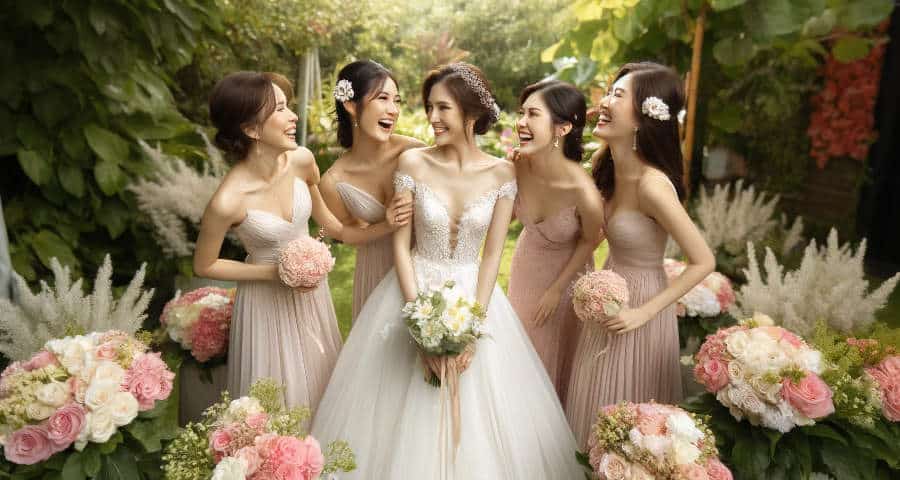
bridesmaids are close friends or family members of the bride who provide support and assistance throughout the wedding planning process and on the big day. They play a key role in helping with various tasks and adding to the joy and spirit of the celebration.
| Role/Responsibility | Description |
|---|---|
| Support for the Maid/Matron of Honor | Assisting the Maid/Matron of Honor with her duties, especially in planning and hosting pre-wedding events. |
| Wedding Planning Assistance | Helping with tasks such as addressing invitations, assembling favors, and coordinating logistics on the wedding day. |
| Dress Selection and Expenses | Accompanying the bride in choosing her wedding dress, selecting their own dresses, and often contributing financially to their attire and accessories. |
| Pre-Wedding Events | Participating in and sometimes helping to plan pre-wedding events, including the bridal shower and bachelorette party. |
| Emotional and Practical Support | Offering emotional support and providing practical help on the wedding day, such as assisting with the bride’s dress and bathroom breaks. |
| Day-of Assistance | Assisting with wedding day preparations, helping the bride get ready, and managing the bridesmaids to ensure the day runs smoothly. |
| Ceremony and Reception Participation | Taking an active role in the ceremony and reception, helping maintain a joyful atmosphere and engaging with guests. |
| Problem-Solving | Addressing any last-minute issues that arise, ensuring challenges are resolved quickly to minimise stress for the bride. |
| Photo Participation | Being cooperative and present during formal photo sessions, helping organise group shots and ensuring timely execution. |
Flower Girl (or Boy)

The Flower Girl or Boy adds a touch of innocence and charm to the wedding procession, typically by scattering flower petals down the aisle before the bride’s entrance. This role, usually filled by a young family member or friend, varies by ceremony and the couple’s preferences.
| Role/Responsibility | Description |
|---|---|
| Aisle Duties | Walking down the aisle ahead of the bride, often scattering flower petals, blowing bubbles, or carrying a bouquet. Innovations like carrying a “Here comes the bride” sign are also popular. |
| Participation in Photos | Joining in formal wedding photographs as part of the bridal party, often providing cute and memorable moments. |
| Ceremony Presence | Stationed near the front during the ceremony. Younger children may sit with their parents after their walk to ensure comfort throughout the service. |
| Pre-Wedding Preparations | Engaging in the rehearsal to understand their role during the ceremony; this helps acclimate them to their duties and the environment. |
| Reception Entrance | Sometimes making an official entrance with the bridal party at the reception, adding to the festive atmosphere. |
| Interaction with Guests | Often greeting guests upon arrival or mingling during the reception, adding charm and delight to the celebration. |
| Attire Coordination | Their attire often mirrors the wedding theme or complements the bride’s dress, enhancing the visual harmony of the ceremony. |
| Age-Appropriate Tasks | Responsibilities are tailored to the child’s age and maturity; younger children may need simpler tasks and more guidance. |
| Adult Supervision | A designated adult or the parents should be available to assist and ensure the comfort and well-being of the Flower Girl or Boy throughout the event. |
Best Man
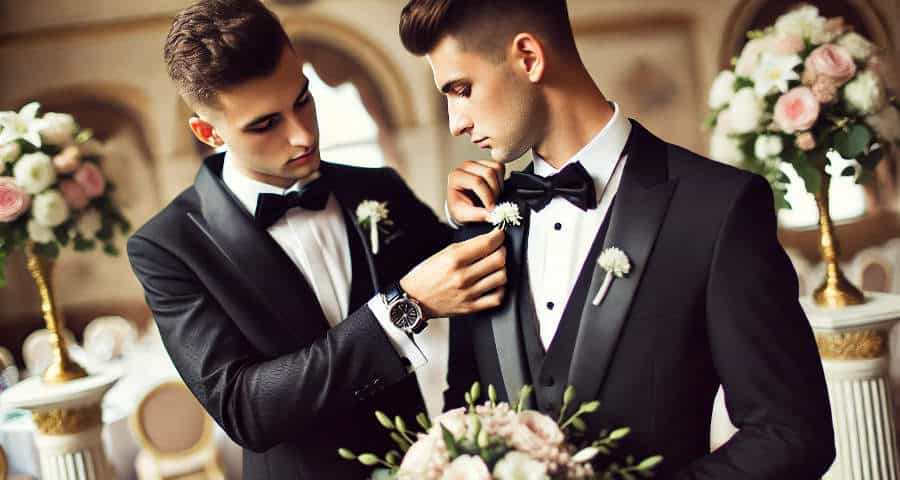
The Best Man is the groom’s right-hand man, providing support and assistance leading up to and during the wedding. His duties range from organizing the bachelor party to keeping the wedding a positive and celebratory experience.
| Role/Responsibility | Description |
|---|---|
| Pre-Wedding Support | Providing moral support to the groom throughout the planning process and leading up to the wedding day, helping to handle stress and offering encouragement. |
| Bachelor Party | Organising the bachelor party with attention to the groom’s preferences, managing logistics, guest invitations, and budget considerations. |
| Coordinating Pre-Wedding Activities | Managing details and logistics for additional pre-wedding activities, ensuring they are enjoyable and align with the groom’s expectations. |
| Wedding Day Logistics | Assisting with wedding day logistics, including transportation for the groom and ensuring he and the groomsmen arrive on time and are well-prepared. |
| Formal Wear Coordination | Helping the groom and groomsmen with their formal wear, ensuring everyone is sharply dressed and coordinated. |
| Holding the Rings | Safeguarding the wedding rings and ensuring they are presented at the right moment during the ceremony. |
| Witnessing the Marriage Licence | Signing the marriage licence as a legal witness, alongside the Maid/Matron of Honor. |
| Ceremony Speech | Delivering a speech or toast at the reception, often reflecting on his relationship with the groom and sharing personal anecdotes. |
| Calming Presence | Serving as a calming influence throughout the planning process and on the wedding day, helping to maintain a joyful and celebratory atmosphere. |
| Coordination and Problem-Solving | Leading the groomsmen, serving as a point of contact for vendors or guests, and addressing any logistical challenges that arise on the wedding day. |
| Post-Wedding Responsibilities | Assisting with post-wedding tasks, such as returning rental items, coordinating transportation for departing guests, and ensuring all vendors are paid. |
Groomsmen
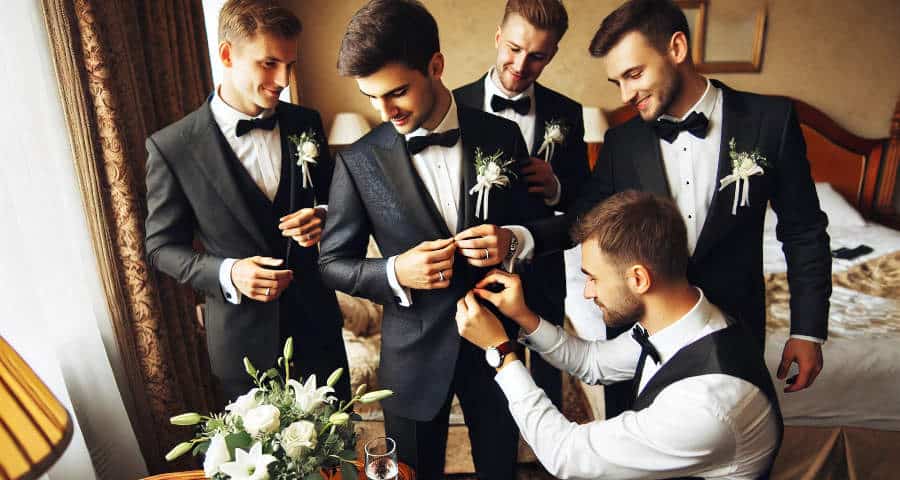
Groomsmen are close friends or family members of the groom who stand by his side on the wedding day. Their responsibilities include supporting the Best Man, participating in the ceremony, and helping ensure the day goes as planned.
| Role/Responsibility | Description |
|---|---|
| Support for the Best Man | Assisting the Best Man with his duties, including organizing the bachelor party and managing logistics on the wedding day. Offering support and helping to keep the groom relaxed and focused. |
| Wedding Planning Assistance | Helping with various tasks as needed, such as setting up the wedding venue, coordinating transportation, and overseeing the timely arrival of vendors. |
| Formal Wear Coordination | Ensuring their attire is on theme and properly fitted, coordinating with the Best Man or groom for any last-minute adjustments. |
| Ceremony Participation | Playing an active role in the ceremony, including being part of the processional, standing with the groom at the altar, and escorting bridesmaids. |
| Reception Assistance | Facilitating a lively atmosphere at the reception, managing guest interactions, and leading dances. Participating in wedding traditions and possibly giving a toast or speaking about the groom, depending on the couple’s preferences. |
| Problem-Solving | Addressing any unexpected challenges that arise during the wedding day, working alongside the Best Man to ensure smooth operations. |
| Escorting Guests | Assisting with seating arrangements and providing directions. Being attentive to the needs of all guests, especially those who are elderly or disabled, ensuring they are comfortably accommodated. |
| Photo Participation | Participating in formal wedding photographs with the groom’s party, helping organize group settings and ensuring timely execution. |
Ring Bearer
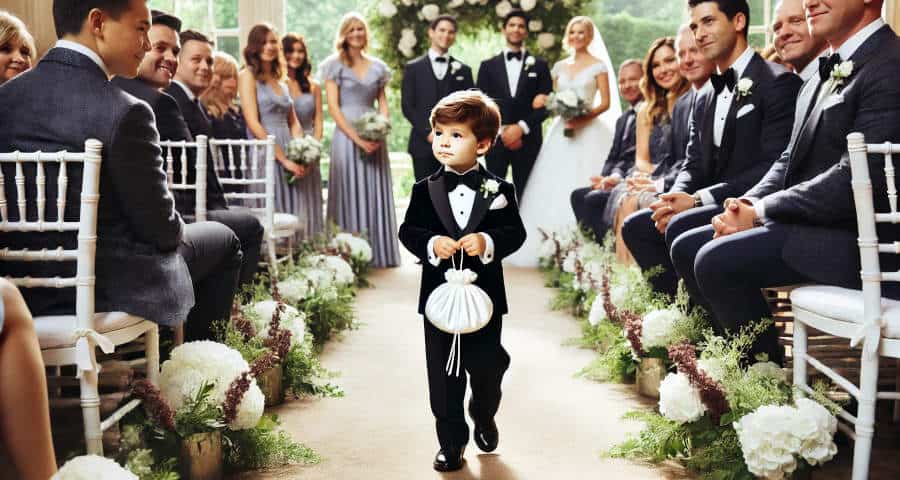
The Ring Bearer is typically a young boy (or girl) responsible for carrying the wedding rings down the aisle to the couple. This role not only adds a cute element to the ceremony but also carries symbolic significance, entrusting a young family member or friend with one of the most important elements of the event.
| Role/Responsibility | Description |
|---|---|
| Carrying the Rings | The primary role of the Ring Bearer is to safely carry the wedding rings down the aisle to the couple, often using a decorative pillow or box. |
| Participation in the Ceremony | Walking down the aisle, typically positioned in front of or behind the Flower Girl. For very young children, consider having them accompanied by an older child or adult. |
| Dressing for the Occasion | Wearing attire that matches or complements the wedding theme and coordinates with the bridal party. |
| Rehearsal Participation | Attending the rehearsal to clearly understand and practise their role during the ceremony. Practical rehearsals at home can also help them feel more comfortable. |
| Photo Participation | Joining in formal wedding photographs as part of the bridal party, capturing their contribution to the ceremony. |
| Adult Supervision | Ensuring a parent or designated adult is close by during the ceremony to help manage any unexpected behaviour and provide comfort if needed. |
| Flexibility and Understanding | Emphasising the importance of being flexible and understanding with the Ring Bearer’s role. Young children can be unpredictable, and their natural behavior often adds to the charm and memorable moments of the ceremony. |
Ushers
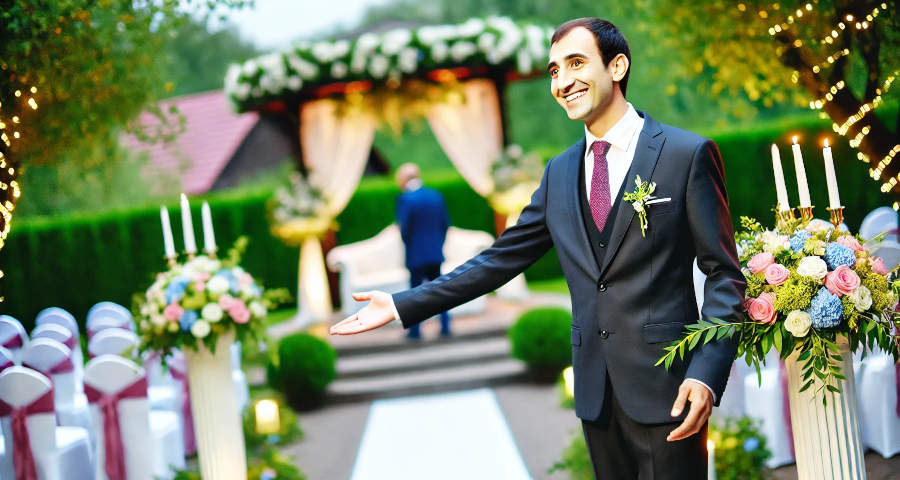
Ushers play a crucial role in managing the ceremony’s logistics, primarily focusing on greeting guests, assisting with seating, and ensuring everything runs smoothly at the venue.
| Role/Responsibility | Description |
|---|---|
| Seating Guests | Responsible for greeting guests as they arrive, showing them to their seats, and helping set a warm, welcoming tone for the event. |
| Order of Seating | Ensuring guests, especially family and VIPs, are seated according to the pre-arranged seating plan. |
| Programs and Directions | Distributing programs or directions for the ceremony and reception, ensuring guests are well informed about the event’s flow. |
| Assisting with Special Needs | Providing assistance to guests with special needs, ensuring they are comfortably accommodated and can fully enjoy the event. |
| Aisle Preparation | Keeping the aisle clear before the ceremony begins and managing the placement and security of the aisle runner, if used. |
| Guest Book and Gift Table | Managing the guest book and gift table, ensuring that all guests sign the book and that gifts are properly secured. |
| Venue Knowledge | Well-versed in the venue’s layout, including the locations of restrooms, exits, and designated smoking areas, ready to assist guests with directions and inquiries. |
| Coordinating with the Wedding Planner | Collaborating closely with the wedding planner or coordinator to ensure all aspects of the ceremony align with the scheduled timeline. |
| Emergency Point of Contact | Acting as a point of contact for immediate issues, ready to handle unexpected situations like seating miscommunications or quick fixes. |
| Reception Guidance | Facilitating a smooth transition of guests from the ceremony to the reception area, often directing traffic and answering queries about the reception schedule. |
| Proactive and Attentive | Remaining proactive, attentive, and friendly throughout the event, playing a significant role in creating a positive and welcoming atmosphere for all guests. |
Officiant
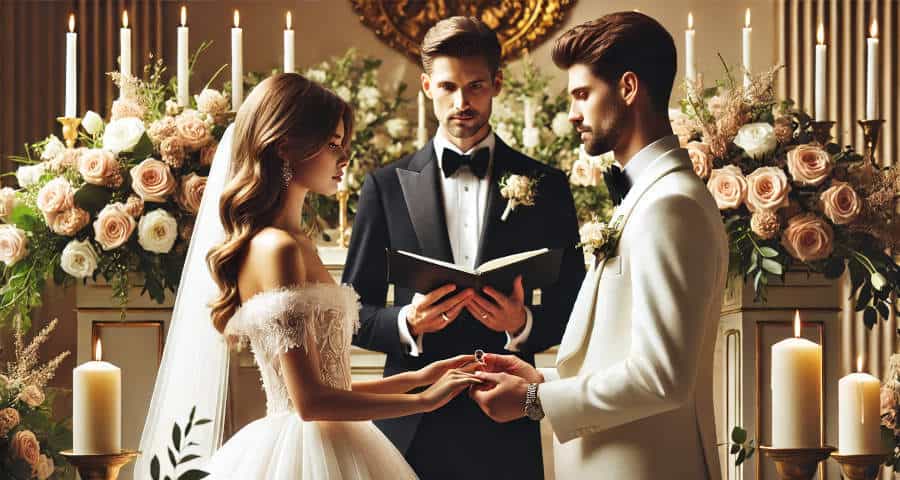
The Officiant is responsible for leading the wedding ceremony, guiding the couple through their vows, and legally solemnising the marriage. This role can be filled by a religious figure, a civil officiant, or even a close friend or family member who has been granted the authority to officiate.
| Role/Responsibility | Description |
|---|---|
| Legal Authority | Must have the legal authority to perform weddings in the jurisdiction where the ceremony takes place. |
| Ceremony Preparation | Works with the couple to plan and customise the ceremony, including any readings, vows, and special rituals to reflect the couple’s personalities and beliefs. |
| Legal Documentation | Ensures all legal documents, such as the marriage licence, are in order and properly signed before or after the ceremony. Helps guide the couple on obtaining their marriage licence and completing necessary legal preparations. |
| Conducting the Ceremony | Leads the wedding ceremony, guiding the couple through their vows and officiating the exchange of rings. Prepared to handle unexpected emotional moments and keep the ceremony proceeding smoothly. |
| Pronouncement of Marriage | Formally pronounces the couple as married according to local laws and traditions. |
| Record Keeping | Submits the signed marriage licence to the appropriate local authorities for official recording. |
| Premarital Counselling | Offers or requires premarital counselling sessions with the couple before the wedding day, discussing marital expectations and legal implications. |
| Ceremony Coordination | Coordinates with the wedding planner, musicians, and other participants to ensure seamless execution of the ceremony. |
| Post-Ceremony Guidance | Advises the couple on post-wedding procedures, including legal name changes and updates to personal records. |
| Professionalism | Ensures punctuality, professionalism, and thorough preparation for the wedding day to contribute to a respectful and smooth ceremony. |
The Father of the Bride

Traditionally, the Father of the Bride has roles ranging from offering financial support to walking the bride down the aisle, symbolising his blessing of the union. These roles can vary significantly based on cultural practices and individual family dynamics.
| Role/Responsibility | Description |
|---|---|
| Financial Support | May contribute to or cover some or all of the wedding expenses, with the extent and nature of support varying widely among families. |
| Emotional Support | Provides emotional support not only to the bride but also to other family members, including the mother of the bride and siblings, throughout the wedding planning process and on the wedding day. |
| Hosting Duties | Assists in hosting or welcoming guests at various wedding events, such as the reception, embodying the role of a gracious host. Often plays a significant role in pre-wedding events like engagement parties or rehearsal dinners. |
| Wedding Planning Input | Offers opinions and advice during the wedding planning process, if requested, and supports the bride in making decisions. |
| Father-Daughter Dance | Shares a dance with the bride during the wedding reception, a cherished tradition that may also include other significant figures. |
| Giving Away the Bride | Escorts the bride down the aisle and ‘gives her away’ to the groom, symbolising support and blessing, adaptable to include joint walks with other family members. |
| Speech or Toast | Delivers a speech or toast at the wedding reception, and potentially during pre-wedding events, reflecting on the bride’s life and offering blessings to the couple. |
| Assisting with Logistics | Helps with logistics, such as transportation for the bride or coordinating with vendors, ensuring smooth operations on the wedding day. |
| Post-Wedding Responsibilities | Participates in post-wedding tasks, such as ensuring that gifts are safely transported and helping with the final wrap-up of the event. |
| Communication and Flexibility | Maintains open communication and flexibility to ensure that his roles and responsibilities align with the couple’s desires and the family’s dynamics, as expectations and traditions can vary significantly. |
The Mother of the Bride
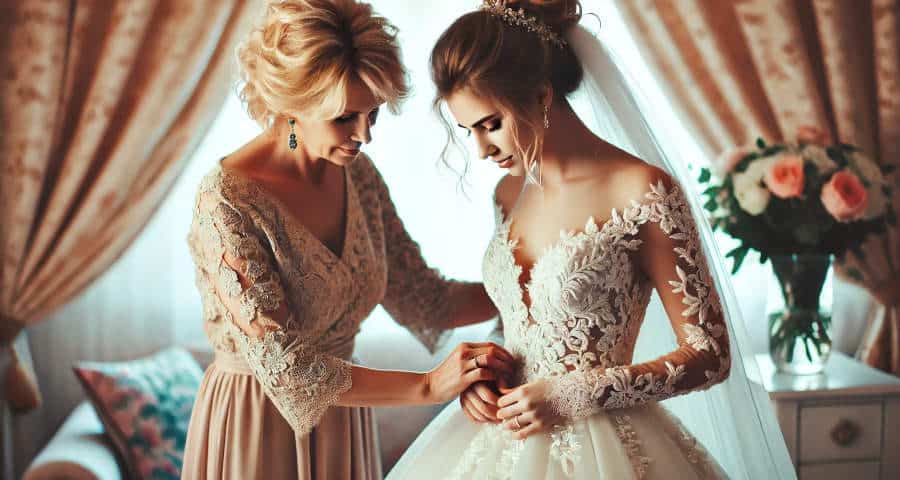
The Mother of the Bride often plays a key role in the wedding planning process, providing emotional support to the bride and assisting with various logistical details.
| Role/Responsibility | Description |
|---|---|
| Support and Guidance | Providing emotional support and guidance to the bride throughout the planning process, helping manage stress and navigate any challenges or conflicts that arise. |
| Wedding Planning Assistance | Assisting with crucial tasks such as selecting the wedding dress, choosing vendors, venue scouting, and also participating in other pre-wedding events like dress shopping trips and rehearsal dinner planning. |
| Liaison with Family and Guests | Acting as a liaison between the bride and family members or guests, especially for gathering RSVPs and addressing inquiries. |
| Bridal Shower | Hosting or assisting in the planning of the bridal shower, along with the Maid/Matron of Honor and bridesmaids. |
| Ceremony and Reception Prep | Assisting with preparations and decorations for the ceremony and reception venues. |
| Attire Coordination | Coordinating her own attire for the wedding day with the bride to complement the wedding’s style and colours. |
| Record Keeping and Budgeting | Helping to keep track of expenses and payments for wedding-related services, if involved in budgeting. |
| Moral and Logistical Support | Offering moral support to the bride and groom, and helping to ensure that the wedding day runs smoothly. |
| Reception Hosting | Assisting in hosting the reception, welcoming guests, and ensuring that everyone feels included and comfortable. |
| Communication and Flexibility | Maintaining open communication to ensure her roles and responsibilities align with the couple’s desires, acknowledging that involvement may vary based on family dynamics, cultural traditions, and the bride’s preferences. |
The Groom’s Parents
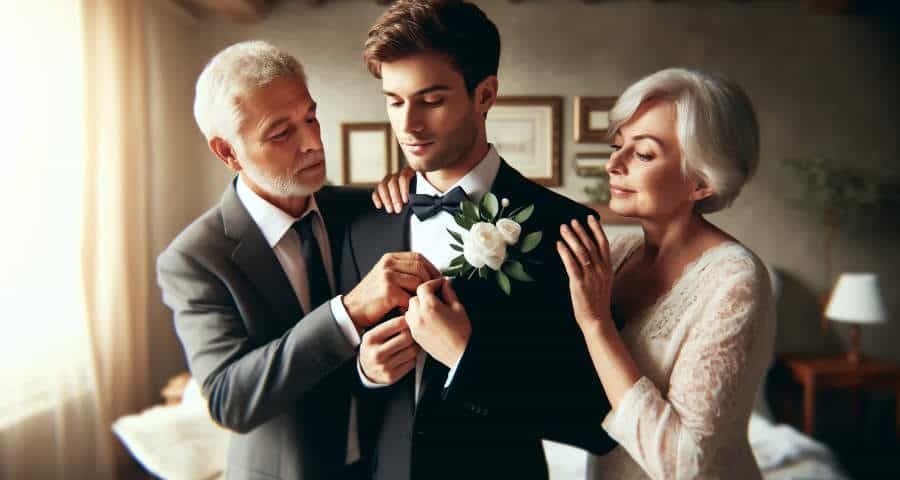
The Groom’s Parents traditionally contribute to the wedding in various ways, from hosting pre-wedding events like the rehearsal dinner to offering support and guidance throughout the planning process.
| Role/Responsibility | Description |
|---|---|
| Hosting Pre-Wedding Events | Traditionally hosts the engagement party and the rehearsal dinner, and may also be involved in other pre-wedding events such as wedding showers or contributing to bachelor party planning, depending on family traditions. |
| Financial Contribution | May contribute to wedding expenses, traditionally covering costs like the rehearsal dinner, and possibly other elements depending on what is customary in their family or culture. |
| Support and Guidance | Offering support and guidance to the couple throughout the wedding planning process, which may include navigating complex family relationships and offering advice on marriage and family life. |
| Guest List Coordination | Helping to compile the guest list for their side of the family, ensuring all relatives and friends are considered and included. |
| Attire Coordination | Coordinating their wedding attire with the couple to match the wedding’s style and formality, ensuring a cohesive look. |
| Ceremony Participation | Participating in the ceremony, possibly including roles such as readings, giving blessings, or assisting with ceremonial elements like the unity candle. |
| Reception Roles | Active roles during the reception, such as greeting guests, participating in toasts, leading dances, and ensuring guests feel welcomed. |
| Moral and Emotional Support | Providing ongoing moral and emotional support to the groom and the couple, helping them manage pre-wedding stress and excitement. |
| Post-Wedding Assistance | Assisting with post-wedding tasks, such as returning rentals, organizing gifts, and helping with the final settlement with vendors. |
| Communication and Flexibility | Maintaining open communication and showing flexibility to ensure that their roles and responsibilities align with the couple’s desires and the family’s unique circumstances, as expectations and traditions can vary significantly. |
Master of Ceremonies (MC)
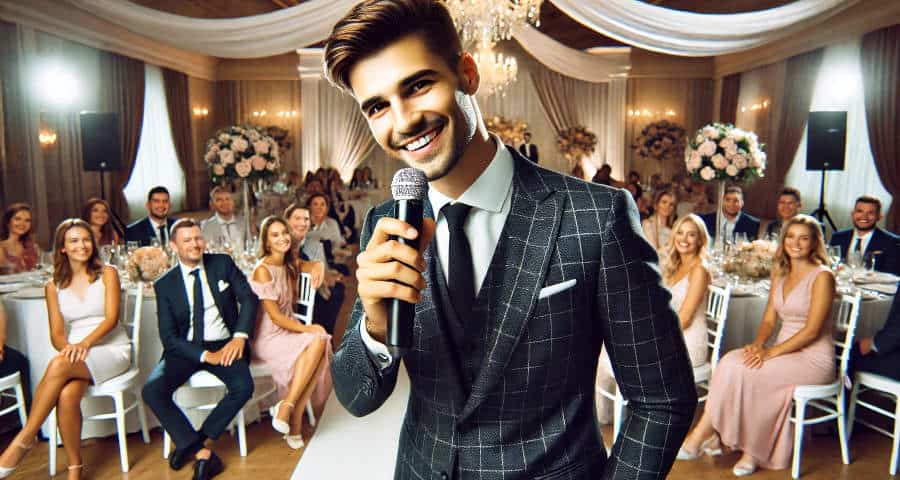
The Master of Ceremonies (MC) ensures the wedding reception runs smoothly by making announcements, introducing speakers, and keeping the event on schedule. This role is crucial for maintaining the flow and energy of the celebration.
| Role/Responsibility | Description |
|---|---|
| Opening Announcements | Welcoming guests and introducing the wedding party and events of the day/evening, setting the tone for the festivities. |
| Coordination of Events | Ensuring the smooth flow of the wedding reception by coordinating speeches, dances, and other activities with other vendors like DJs and catering staff. |
| Introducing Speakers | Announcing the names of individuals giving speeches or toasts, providing a brief introduction for each to personalise their contribution. |
| Directing Guest Attention | Guiding the guests’ attention to various focal points throughout the event, such as the cake cutting, bouquet toss, or the first dance. |
| Time Management | Keeping the event on schedule, making adjustments as necessary to accommodate any delays or changes, ensuring all planned activities occur. |
| Engaging the Audience | Keeping the guests entertained and engaged, using dynamic interaction techniques to ensure a lively and enjoyable atmosphere. |
| Problem Solving | Addressing unexpected issues or changes in the schedule, such as delays in activities or last-minute changes in the event layout, working closely with the wedding planner or couple to resolve them efficiently. |
| Closing Remarks | Concluding the event with closing remarks, thanking guests for their attendance, and providing any final instructions, such as directions to the after-party location or reminders about transportation. |
Wedding Vendors

Choosing the right vendors is crucial for ensuring that your wedding day is as perfect as you’ve imagined. Each vendor plays a specific role, contributing their expertise to different aspects of the wedding.
| Vendor | Role/Responsibility |
|---|---|
| Wedding Planner | Coordinates all logistics of the wedding, from planning to execution. Manages vendors, budget, timeline, and day-of coordination. |
| Caterer | Provides all food and beverage services, including menu design, food preparation, and service during the event. |
| Photographer | Captures all moments of the wedding day, from preparations to the reception. Delivers a portfolio of edited images and possibly albums. |
| Videographer | Records the wedding, capturing live moments to produce a wedding film. Offers edited video and raw footage. |
| Florist | Designs and supplies all floral arrangements, including bouquets, centerpieces, and venue decorations. |
| Cake Designer | Creates and delivers the wedding cake and other dessert items, coordinating with the couple on design and flavors. |
| DJ/Band | Provides musical entertainment, manages the event’s audio needs, and helps coordinate the flow of the reception. |
| Officiant | Conducts the wedding ceremony, collaborates on the ceremony script, and handles legal documentation like the marriage license. |
| Rental Company | Supplies necessary rental items for the wedding, including chairs, tables, linens, tents, and other decor elements. |
| Hair and Makeup Artists | Provide beauty services to the wedding party, ensuring styling is completed on time and in accordance with the wedding theme. |
| Transport Services | Coordinates and provides transportation for the wedding party and guests if needed, ensuring timely arrival and departure. |

